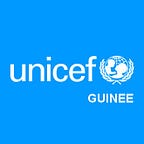Community agents and community health workers jointly working to save the lives of the children of Bossou
With the financial support of TAKEDA, UNICEF is promoting the integrated management of childhood illnesses in the targeted districts to reduce the under-five children mortality rate, which is basically due to the three major diseases to wit malaria, diarrhea and pneumonia, and as part of the strengthening of the health system in Guinea as well.
To achieve this, community health workers (ASC) and community agents (RECOs), facilitate the care of any child suffering from one of the above-mentioned diseases at the community level through a synergistic approach of social mobilization. The community agents (RECOs), who live in the community, visit the various households on a daily basis to check on children’s health status, compliance with the vaccination schedule, promotion of exclusive breastfeeding, home monitoring of pregnant women, promotion of sanitation and public hygiene. « As usual, I go from one household to the next to see if there are any sick children and remind mothers of their next appointments at the health center. It was during this daily duty that I met Nözöly Goumy who had a warm body, and I did her rapid malaria screening test. That’s how I administered the drug that had been given to us for the management of minor malaria cases and he fortunately recovered his health, for he was much better the next day I came back,.», reported Louise Nialé, a community agent (RECO) of Bossou-center, a rural commune in the prefecture of Lola.
Louise Nialé also referred a case of malnourished children to the Bossou health center. This child has been taken care of and is also doing well.
« I have been trained and equipped by UNICEF and now I work for my community. I visit my neighbors to carry out prevention activities, curative promotions in order to bring quality health services as close as possible to my population par my targeted children and pregnant women. Once in the households, I review the vaccination schedules of children and pregnant women to see if they are up to date, but also to check if children met in the households visited have birth certificates and also to teach households about basic family practices. Recently, I was able to identify a malnourished child and referred him to the health center for care. Thank God, he has recovered and is in good shape today with the support of the health center staff».
It must also be noted that health centers have been provided with essential medicines that are given to RECOs (community agents), which are in direct contact with parents of children at the community level. These drugs, being at the disposal of RECOs, help to provide home care for simple cases of childhood illnesses. RECOs immediately refer complicated diseases cases of the child to the health center for appropriate care by qualified health personnel.
In this dynamic of integrated management of childhood illnesses at the community level, the ASCs (community health workers) who are responsible for supervising the work of RECOs (community agents) in the field, assist the latter when it comes to managing cases that exceed their capacities. The ASCs also provide them with capacity building trainings. Christine Malomou, the ASC (community agent) of Bossou remembers the last two cases she recently backed up. « Since RECOs have the rapid malaria screening tests at their disposal, they report to us whenever they perform it. In the event of major difficulties that require our intervention, we go to the site to provide them with our full support. Last May, in Gbah, a village located at 8km from Bossou, there was a child who was suffering from the onset of malaria as the RECO test had confirmed it. The RECO gave him the first treatments and monitored the child’s health status. After he noticed that there was no improvement, he explained to the parents the importance of continuing the treatment at Bossou Health Centre. The parents understood and agreed to be accompanied. When I went there, the parents and I took the child to Bossou health center for care. He was quickly treated and recovered quickly from this malaria. There was also another case in Tringhara, another village located at 6km far from Bossou. It took us the same procedure».
The referral system for complicated cases of childhood illness in the commune of Bossou seems to be functional between RECOs and CSAs. This is an obvious proof of the effectiveness of the strategy for implementing Community health policy. Because, as soon as a child is referred to the health center, he or she is immediately taken care of, as Manamba Sacko, Head of the Bossou Health Centre explains: « When we see a child who is referred here through RECOs, we give a consultation in accordance with the Integrated Management of Childhood Illness protocols. Following these consultations, on a case-by-case basis, we try to take care of patients whose cases perfectly meet our skills according to the set of services of the health center, but if it is a case that is not part of our domain, we refer it in our turn to the prefectural hospital of Lola for care. But thank God, we haven’t had to deal with cases that are beyond our domain so far».
Being under the supervision of the ASCs, RECOs reassure people that they are maintaining these assets and continue their work in the communities of Bossou for the benefit of children and women in particular. This will inexorably contribute to the reduction of the child mortality rate in the rural commune of Bossou.
Saa Momory KOUNDOUNO, UNICEF in Guinea
